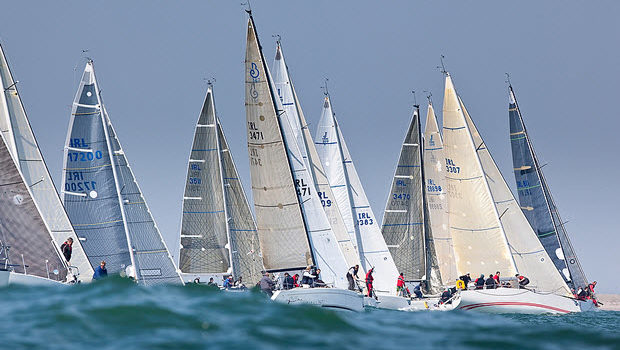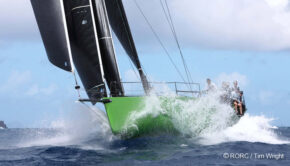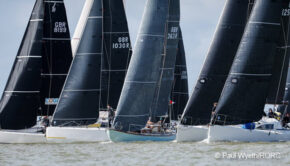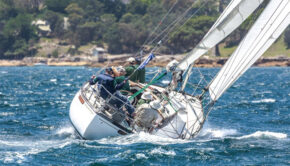Giving Everyone Something to Race For
Published on March 16th, 2017
Brian Turvey describes in Afloat.ie the ECHO performance handicapping system used in Ireland to encourage participation and enthusiasm among the cruiser/racer crowd.
Most racing sports appear relatively straightforward to the uninitiated and only reveal new layers of complexity as you become more involved and enthused to watch or participate. Consider Formula One racing, it seems straightforward – scream around the course faster than anyone else and you win.
Then consider the sport of yacht racing, commonly recognised to be the most complicated sport to learn and there is little dispute that it is the most complicated of all to follow. Most sailors have attempted a well-intentioned explanation of the sport to a non-sailor, but very few are gifted with the skill to articulate it and fewer manage to retain the attention and interest of even the most fervent of enquirers.
But explaining the concept of yacht racing is only the first layer. Now add the much-used rating handicap systems.
The goal of trying to narrow and equalise the finishing time of all competitors in a race is common to lots of sports and based on a measurement calculation, the first version was standardised in yacht racing during the 19th century. There have been many variants and evolution of the original formula and rule, with the dinghy-measurement version ‘Portsmouth Yardstick’ (PY) being the winner for longevity.
Endorsed by Irish Cruiser Racing Association (ICRA) and the Irish Sailing Association (ISA), the system currently preferred by more than 7000 boats worldwide including most Irish and British yachts is the RORC‘s ‘IRC Rating.’ Closely monitored by yacht designers and engineer-types, it is essentially a formula that uses various boat measurements to calculate a rating number.
When each rating is applied to every boat in a race and all other factors being equal, the factor-adjusted elapsed time should have every boat finish equal, or so the concept should work. And it does, for the most part. The theory and practice would be that those crews who best optimise their performance during the race, will win.
But as the designers get smarter and yesterday’s yacht tumbles in value, the rule-masters in the RORC have to stay alert and agile to keep pace and keep relevant for their broad range of customers. However, they will always be ‘followers’, at best reacting a-season-too-late to those design enhancements that would otherwise render older racing designs obsolete much faster than their owners would stand for.
So buying a well-rated IRC cruiser-racer is a bit like committing to the latest gadget, it will be out-performed in no time by the next best thing, albeit with some notable exceptions. What then for the enthusiastic racing owner of an older or lesser-rated design?
Giving 5 minutes per hour to boats that frequently cross the line ahead of them will wear the enthusiasm for the sport from owner and crew in no time. There is a safety net and it is in the form of the next layer of complexity in cruiser-racing: Performance-Rated Handicapping.
Built under the guidance of the then ISA President Paddy O’Neill, ECHO (East Coast Handicap Organisation) was created by a team of Irish amateur sailors including Ernest Gouding, Hal Silk, Billy Lacy, Chris Bruen, Arthur Barker, John Deane and Chick Brown who all brilliantly blended their interest in sailing with their maths skills.
The ECHO system has grown to be the main performance-based cruiser racing handicap system in Ireland and has in recent years been adopted and adapted internationally alongside measurement rating systems such as IRC and ORC.
With help from the Dublin Bay Sailing Club’s Brian Barry, it was integrated into a unique database-structured sailing results system built by Colin McMullen for DBSC and Howth Yacht Club. Colin had the distinction of being the only professional computer programmer in the world who was a sailor.
ECHO, which was known in certain circles as as ‘Earnest, Chris Hal and Others’, is best compared to handicapping in horseracing, but by adjusting the elapsed time instead of saddlebag weight.
Calculated by and based on previous performance history, the formula calculates a rating for every boat that should have all boats finish on equal time. Whilst this desired end-point is similar to that of the measurement-based rating, it has a very different rationale. ECHO is designed to reward crews that out-perform their recent average results.
The theory behind ECHO is that any boat can win, relative to their own performance history. The actual specification and design of boats is irrelevant and in theory, the slower and obsolete designs now have every chance of winning under ECHO. The ‘lower end’ of the fleet have something to race for, encouraging crew on the lesser competitive boats, eliminating the ‘what’s the point’ factor, whilst maintaining and encouraging participation. Everyone’s a winner, well perhaps not quite…
For ECHO to work optimally as per the concept, it relies on ‘consistency’ and all the possible variables need to be removed, or minimised at worst.
• The same boats and same number of boats must be continually racing against each other in each race. Every deviation in numbers competing and/or infrequent entries will alter all boats handicaps accordingly. This makes it at best very difficult, but normally impossible to assign initial handicaps to a mixed fleet of boats that haven’t recently nor regularly raced together. In these circumstances a ‘link’ boat is used where there is found to be a record of it racing against the other boats before, but it rarely works, because ECHO works best with local fleets.
• ECHO’s focus is on the relative difference in performance of a boat (particularly the crew), so a change in personnel will often alter performance and therefore another variable is introduced. It should be noted that there is an obligation on boats racing under ECHO to declare substantive changes to crew, but in practice, most changes go ‘under the radar’ and rarely get declared.
• Any variation from the average/normal in weather conditions will affect the mean calculations. For example, lighter than average winds might favour the lighter displacement boats.
• Any alteration in the type of course (from the average) will introduce another variable. Different boat designs will vary in performance on specific up wind, downwind and reaching legs.
• There is also the issue of ‘sandbagging’ or deliberately underperforming in order to reduce ECHO rating and use this in the next or later race to advantage. This is very difficult to prove in competitive fleets, because a boat can lose places very easily and in genuine circumstances.
The ECHO administrators allow direct manual intervention to address anomalies such as these, but a results system that affords interpretive adjustments could be seen to be subjective and potentially ambiguous. Single race regattas are the most problematic, where new boats are added without previous integration in that fleet. Interestingly, it seems to work in the potentially controversial sport of horse racing without complaint.
ECHO is often erroneously compared to a golf handicap, but has little in common other than being performance-related. Golf handicaps are not derived from team performance; it is one person versus the course and the other competitors have neither influence on nor an ability to intentionally affect an opponent’s score. Also, golf is not a race.
Performance-rated yacht racing is almost always a team-sport, where with certain probability, every race will mean a change in performance by at least one boat, necessitating handicap revisions to all.
The step towards ‘progressive’ maintenance of ECHO handicaps was a welcome one for racing sailors that embrace the performance handicap, because it readjusts after every race. (ECHO used to only adjust periodically, often causing consternation in fleets by huge changes happening at one time.)
However, as a consequence of this, it is almost impossible for an experienced and ECHO–savvy competitor to determine their actual standing during a race – what must it be like for the newbie or spectator? Whatever the difficulty with deducing the standings during an IRC race, performance handicap races are absolutely not spectator events.
But to be stressed out about the accuracies and anomalies of this system is futile. It will raise the passions of many a sailor, particularly when a calculation seems to produce an unfair result. Like measurement ratings, ECHO handicapping is not a pure science, but with the probability of so many variables, sailors need to know that it is always imperfect.
With the development of relatively simple sailing results software and the adoption of ECHO-type systems by sailing clubs and classes across the world, it is now possible to use this software for most sailing events and club racing. Lots of one-design classes have effortlessly added performance handicap prizes to their traditional ‘scratch’ races and events.
Club volunteers who are using software packages such as Sail 100, SailWave and Top Yacht can now set up performance handicapping for dinghies, one-design keelboats and for cruiser racing in addition to providing results for Scratch, PY and IRC. This is now an attractive proposition for many clubs, because performance handicapping works best for local fleets where the same boats and sailors race together frequently.









 We’ll keep your information safe.
We’ll keep your information safe.